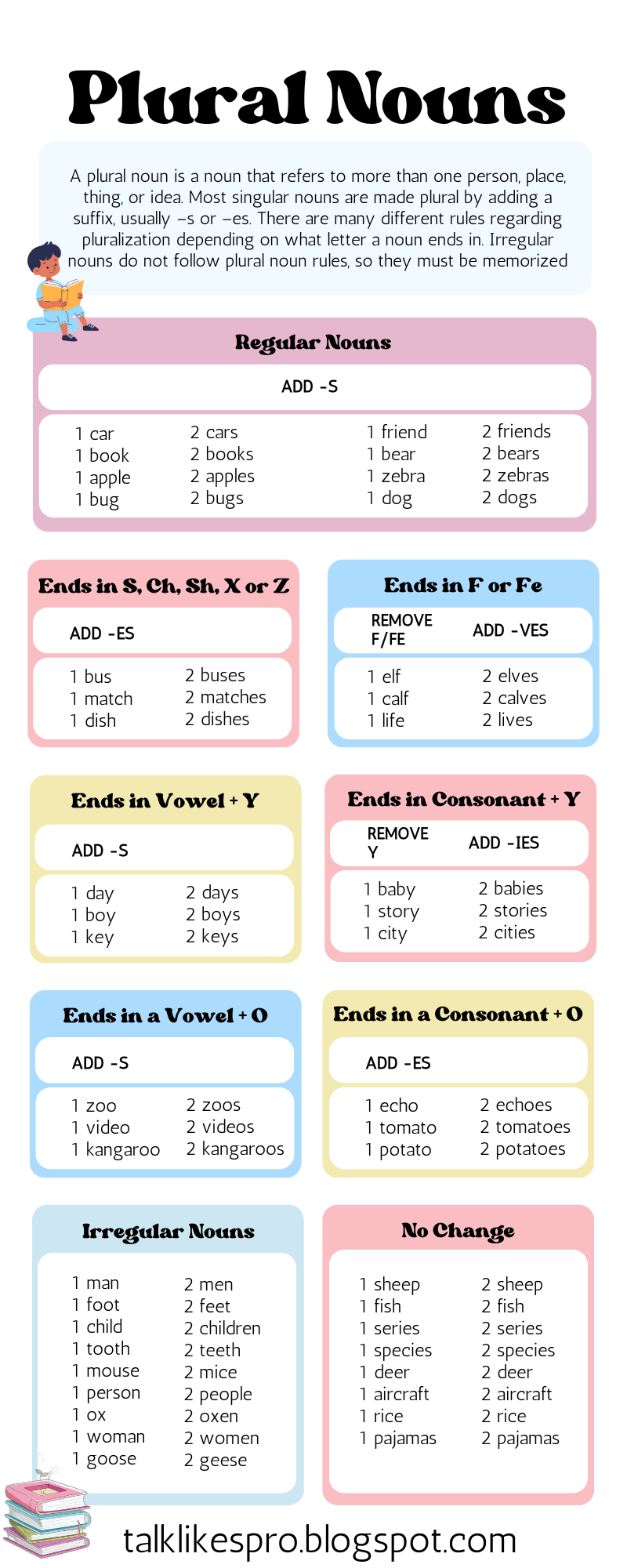Regular plural noun is a word that names more than one person, animal, or thing by adding s or es to the end. These nouns follow simple rules to show that there is more than one. Understanding regular plural nouns helps us talk about multiple things easily.
What is a Regular Plural Noun?
A regular plural noun is a noun that follows standard rules for becoming plural. In English, the most common way to form a plural noun is by just adding an -s or -es to the end of the singular form. As simple as that.isn't it? These nouns are straightforward and predictable, making them easier to learn and use correctly.
Definition: A regular plural noun is a word that names more than one thing, person, or animal by adding -s or -es to the end. For example, cat becomes cats and bus becomes buses. Regular plural nouns follow simple and clear rules to show that there is more than one.
Rules of Regular Plural Nouns
Understanding the rules for forming regular plural nouns is very improtant for proper grammar. Here are the very primary rules:
Adding -s: Most nouns form their plural by simplyjust adding -s to the end.
- Example: cat → cats, book → books
Adding -es: For nouns ending in -s, -ss, -sh, -ch, -x, or -z, add -es to make them plural.
- Example: bus → buses, brush → brushes, box → boxes
Changing -y to -ies: For nouns ending in a consonant followed by -y, change the -y to -ies.
- Example: baby → babies, city → cities
Adding -es for -o: For some nouns ending in -o, add -es to form the plural.
- Example: tomato → tomatoes, hero → heroes
Adding -s for -f or -fe: For some nouns ending in -f or -fe, change the -f to -v and add -es.
- Example: wolf → wolves, knife → knives
Regular Plural Nouns List
Here is a list of common regular plural nouns:
- apple → apples
- car → cars
- dog → dogs
- dish → dishes
- box → boxes
- baby → babies
- story → stories
- leaf → leaves
- wife → wives
- hero → heroes
Regular Plural Nouns Examples in Sentences
To see how regular plural nouns function within sentences, consider the following examples:
- The dogs are playing in the park.
- She has three books on her desk.
- We saw several buses on the street.
- The babies are sleeping in their cribs.
- The boxes are stacked in the corner.
- There are many cars in the parking lot.
- The flowers in the garden are blooming.
- He collected colorful shells from the beach.
- The students are studying for their exams.
- The birds are singing in the trees.
Common Mistakes
Even with clear rules, mistakes can happen. Here are some common errors:
Misapplying rules: Adding "-es" instead of "-s" when not needed.
- Incorrect: car → cares
- Correct: car → cars
Forgetting vowel changes: Not changing -y to -ies for nouns ending in a consonant plus -y.
- Incorrect: baby → babys
- Correct: baby → babies
Irregular application: Applying regular plural rules to irregular nouns.
- Incorrect: child → childs
- Correct: child → children



